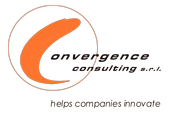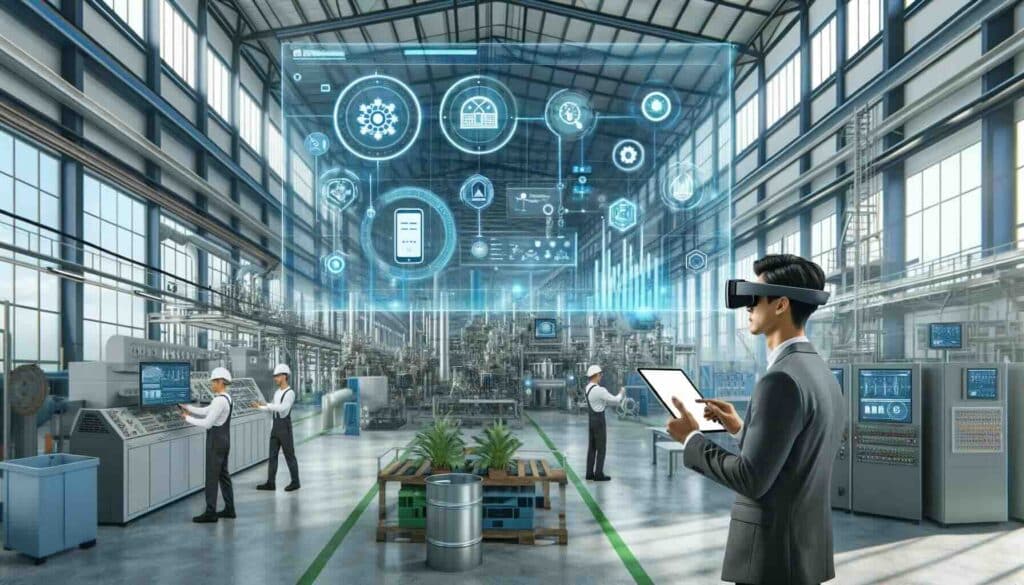Sustainability is no longer just a buzzword; it has become a critical consideration for investors, the public, and employees. The engineering and manufacturing sectors, especially within the pharmaceutical industry, have pledged to achieve carbon neutrality in the coming decade. As a leader in integrated engineering services, Convergence Consulting is at the forefront of this green revolution, leveraging advanced technologies like the Industrial Internet of Things (IIoT) and Augmented Reality (AR) to drive energy efficiency and waste reduction.
First, we want to clarify the main difference between IOT and IIOT briefly.
1. Definition and Scope IoT and IIoT
IoT (Internet of Things):
- General Scope: IoT encompasses various devices and applications in various sectors, including consumer electronics, smart homes, healthcare, and more.
- Examples: Smart thermostats, fitness trackers, connected home appliances, and smart lighting systems.
- Primary Focus: Enhancing convenience, improving quality of life, and providing new consumer experiences.
IIoT (Industrial Internet of Things):
- Industrial Focus: IIoT is a subset of IoT specifically designed for industrial applications. It emphasizes improving operational efficiency, productivity, and safety in industrial environments.
- Examples: Industrial robots, predictive maintenance systems, connected machinery, and smart factories.
- Primary Focus: Optimizing industrial processes, reducing downtime, and enhancing the safety and reliability of industrial operations.
2. Applications IoT and IIoT
IoT Applications:
- Smart Homes: Devices like smart thermostats, security systems, and voice-activated assistants.
- Healthcare: Wearables for health monitoring, remote patient monitoring systems.
- Consumer Electronics: Smart TVs, connected appliances, and personal gadgets.
IIoT Applications:
- Manufacturing: Automation and control systems, predictive maintenance, and real-time analytics.
- Energy: Smart grids, remote monitoring of energy plants, and efficient energy management.
- Logistics and Supply Chain: Asset tracking, fleet management, and warehouse automation.
3. Technological Requirements IoT and IIoT
IoT Technologies:
- Connectivity: Primarily relies on Wi-Fi, Bluetooth, Zigbee, and other consumer-grade communication technologies.
- Data Analytics: Focuses on user data and behavioral analytics.
- Security: While important, the security measures are generally less stringent than industrial standards.
IIoT Technologies:
- Connectivity: Utilizes robust industrial-grade communication protocols like Ethernet, Modbus, and OPC-UA.
- Data Analytics: Employs advanced analytics for real-time monitoring, predictive maintenance, and process optimization.
- Security: Requires stringent security protocols to protect critical infrastructure and sensitive industrial data from cyber threats.
4. Reliability and Safety IoT and IIoT
IoT Reliability and Safety:
- Reliability: Consumer-grade reliability standards are often sufficient, emphasizing user convenience.
- Safety: Focuses on user safety but with less critical implications than industrial environments.
IIoT Reliability and Safety:
- Reliability: Industrial-grade reliability standards are crucial, ensuring minimal downtime and high availability.
- Safety: Critical safety measures are necessary to protect workers, equipment, and industrial processes, often adhering to strict regulatory standards.
5. Data Volume and Processing
IoT Data:
- Volume: Generally involves smaller data volumes generated by individual consumer devices.
- Processing: Data processing often occurs in the cloud, with edge processing gaining traction for real-time applications.
IIoT Data:
- Volume: Generates large volumes of data from numerous industrial sensors and devices.
- Processing: Requires both edge computing for real-time data processing and cloud computing for large-scale analytics and storage.
6. Scalability and Interoperability
IoT Scalability:
- Scalability: Designed to scale for millions of consumer devices, often within a single ecosystem.
- Interoperability: Focuses on compatibility between different brands and platforms facilitated by common standards.
IIoT Scalability:
- Scalability: Designed to handle complex industrial networks with scalability tailored to industrial plants and large-scale operations.
- Interoperability: Emphasizes seamless integration of diverse industrial systems and legacy equipment, requiring specialized protocols and standards.
Understanding the distinctions between IoT and IIoT is crucial for businesses and consumers. While IoT enhances everyday life through smart devices, IIoT drives industrial transformation by optimizing operations and ensuring safety. Companies aiming to leverage these technologies must carefully consider their specific needs and choose the right solutions to achieve their goals.
Having clarified this necessary distinction between IOT and IIOT, let’s move on to delve deeper into the topic of our article: The Role of IIoT in Sustainable Engineering.
The Role of IIoT in Sustainable Engineering
Digital technologies such as IIoT are instrumental in promoting sustainable practices. At Convergence Consulting, we harness the power of IIoT to optimize energy consumption, minimize waste, and enhance the overall efficiency of manufacturing processes. Our approach uses IIoT sensors to monitor critical parameters such as temperature, humidity, and operational performance, ensuring optimal conditions throughout the production cycle.
For instance, maintaining precise environmental conditions during storage and transportation is crucial in the pharmaceutical industry. IoT sensors enable continuous monitoring, ensuring products remain within specified parameters and reducing spoilage and waste. By integrating these sensors into the production process, we can track and optimize energy usage, significantly cutting down unnecessary consumption.
Digital Performance Management: A Game Changer
Our partnership with leading software providers allows us to offer solutions like ThingWorx Digital Performance Management (DPM). This tool empowers manufacturing teams by providing comprehensive data-driven insights into production downtime and inefficiencies. By identifying and addressing the root causes of downtime, our clients can enhance operational hours, save energy, and reduce waste.
Implementing DPM supports a continuous improvement process, often based on LEAN principles. This systematic approach ensures improvements are implemented and sustained over the long term. Companies can optimize resource utilization by eliminating root causes of inefficiencies—mechanical issues or human errors—reducing operational costs and environmental impact.
Maximizing Machine Lifespan with Predictive Maintenance
Powered by IIoT, predictive maintenance is another critical component of our sustainability strategy. By continuously monitoring the condition of machinery, we can predict when maintenance is required, thereby preventing unexpected breakdowns and extending the lifespan of equipment. This proactive approach enhances the reliability of production lines and reduces the need for frequent replacements, minimizing the environmental impact of manufacturing operations.
Real-World Impact: Case Studies
The impact of IIoT and AR technologies is evident in our clients’ success stories. For example, the World Economic Forum’s Global Lighthouse Network highlights numerous projects where companies have achieved remarkable efficiency and sustainability improvements by implementing IoT sensors and digital platforms. These projects have reduced energy consumption and CO2 emissions by as much as 25%.
One notable example is SIG, a manufacturer of aseptic carton packaging. By collaborating with Convergence Consulting and leveraging IoT solutions, SIG significantly improved operational transparency and efficiency. The integration of real-time data collection eliminated the need for manual entries, revealing previously unnoticed micro-failures and enabling swift corrective actions. This enhanced visibility translated into reduced energy consumption and material waste, underscoring the transformative potential of digital technologies.
Augmented Reality: Elevating Training and Maintenance
Augmented Reality (AR) is another transformative technology Convergence Consulting employs to enhance sustainability. AR facilitates virtual tours and remote assistance, reducing the need for physical travel and associated carbon emissions. In maintenance operations, AR provides technicians with real-time, step-by-step instructions, significantly reducing the likelihood of errors and ensuring timely interventions.
For instance, Merck’s pharmaceutical plant in Haarlem has successfully implemented AR solutions to train operators and maintenance technicians. Using PTC’s Vuforia Expert Capture, Merck created interactive training modules that are accessible via smart glasses and other devices. This approach enhanced the accuracy and efficiency of maintenance tasks. It reduced the company’s reliance on paper-based instructions, contributing to significant consumable savings and reduced material waste.
Comprehensive Sustainability Through Digital Transformation
Integrating IoT and AR into our engineering services at Convergence Consulting is part of a broader digital transformation strategy to enhance sustainability. By digitizing standard operating procedures (SOPs), we provide our clients with a robust framework for managing and executing complex processes with greater precision and efficiency. Digital SOPs reduce the incidence of errors and associated waste, ensuring a more sustainable and cost-effective production environment.
Research supports AR’s efficacy in training and operational contexts. Companies using AR solutions have reported potential savings of up to $27 million, primarily through reductions in scrap and errors. This underscores the financial benefits of digital transformation and highlights its positive environmental impact.
Conclusion: Driving Forward with Convergence Consulting
At Convergence Consulting, we are committed to leading the charge towards a more sustainable future. Our expertise in IIoT and AR technologies positions us uniquely to help our clients achieve their sustainability goals while maintaining operational excellence. By optimizing energy consumption, reducing waste, and enhancing efficiency, we enable our clients to meet regulatory requirements, satisfy investor and public expectations, and improve their competitive edge.
If you are ready to transform your operations and embrace a sustainable future, partner with Convergence Consulting. Contact us today to learn more about how our innovative solutions can help you achieve your sustainability objectives and drive lasting value for your business.


Leave a Reply